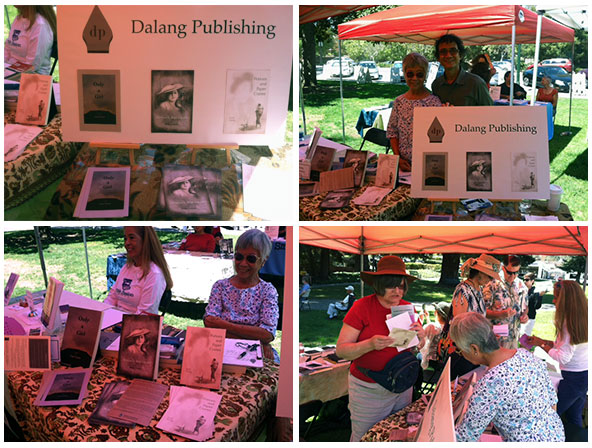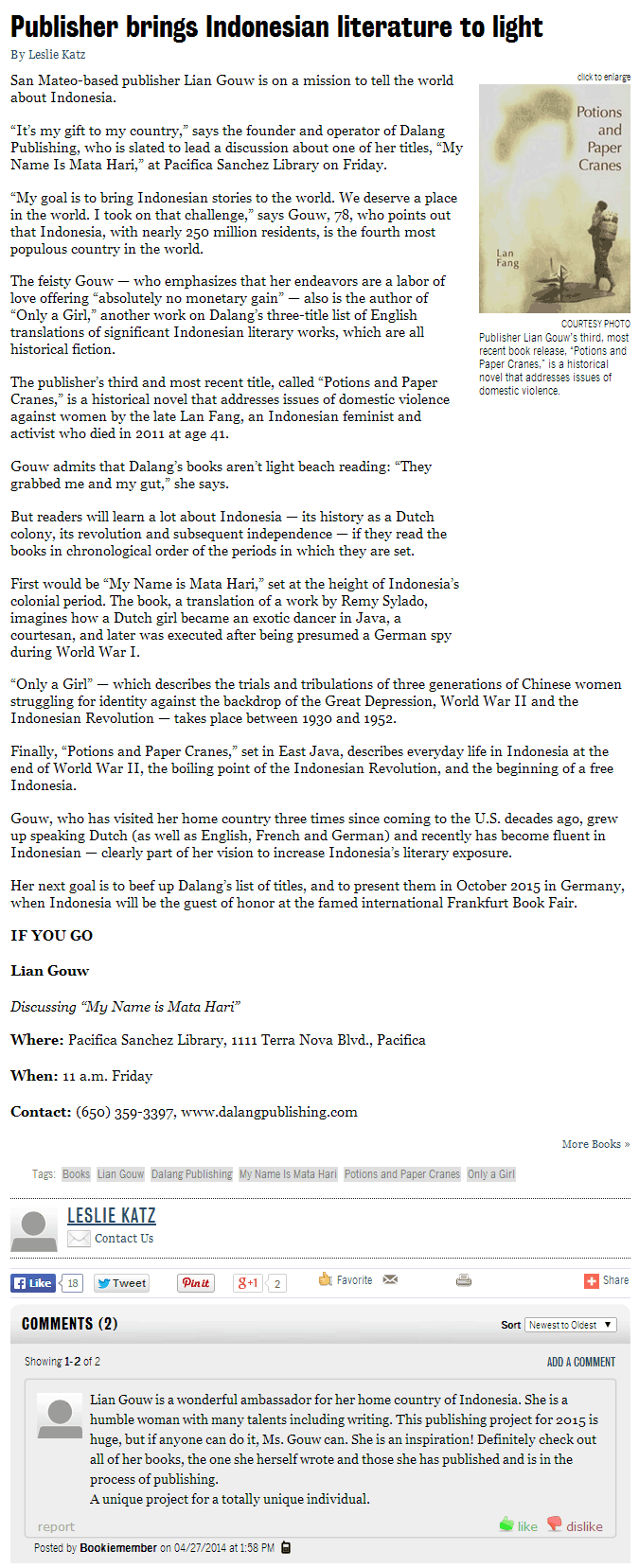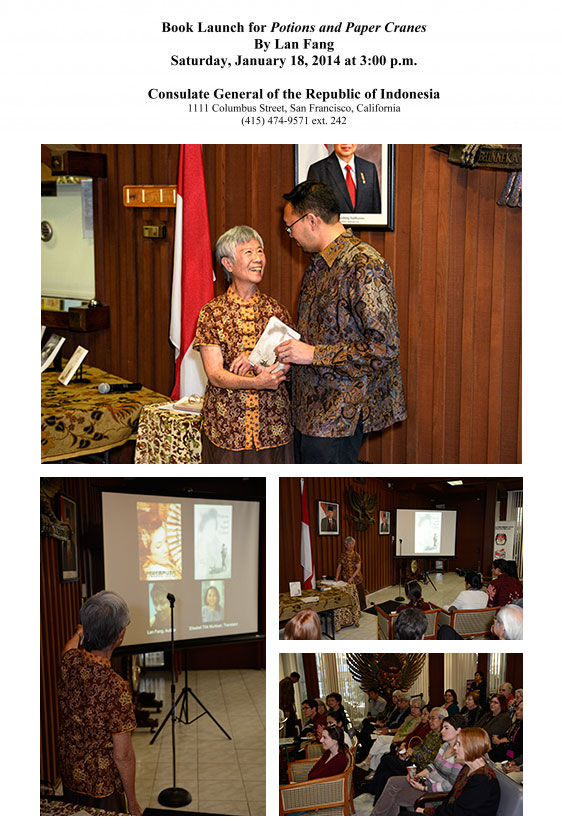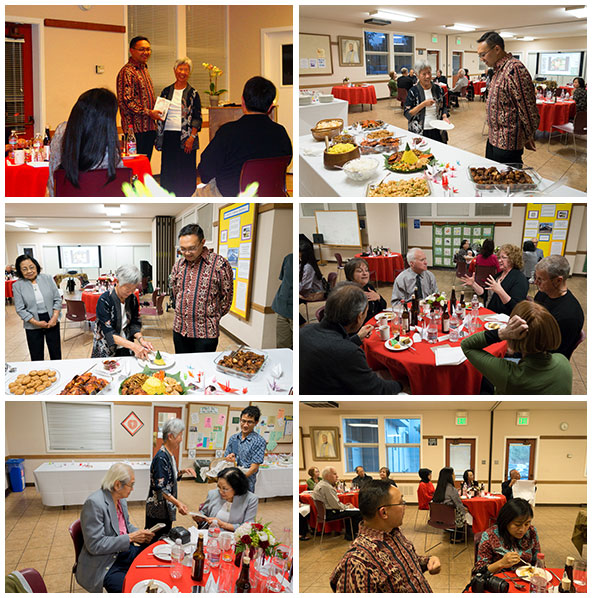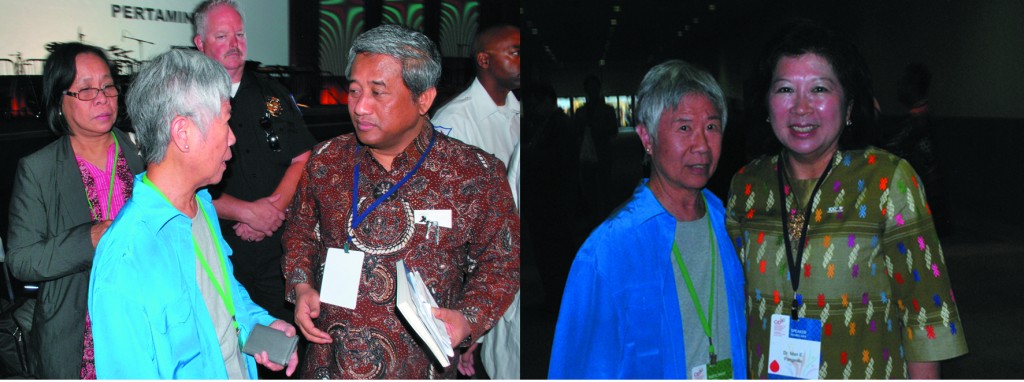Indra Tranggono, born in Yogyakarta on March 23, 1960, is a cultural observer and widely published short story, script writer. Between 2002-2012 his short stories appeared seven times in the Kompas Short Stories Selection. Iblis Ngambek (The Sulking Devil Penerbit Kompas, 2003 and Sang Terdakwa (The Defendant Yayasan untuk Indonesia, 1998) are two of his best known short story collections.
Indra is an editor of the anthology of Yogyakarta poets, Sembilu: Antologi Puisi 21 Penyair Yogya (Pustaka Pelajar, 2005).
Indra’s recent publications include the following monoplays: “Saputangan Fang Yin” (Fang Yin’s Handkerchief), 2013, has been performed at the Gedung Societet in Yogyakarta and “Negaraku sedang Demam” (My Country has a Fever), 2011, has been performed in the Teater Arena in Surakarta. The drama “Monumen” (“The Monument”) – Yayasan untuk Indonesia, 2002, was performed in Yogyakarta. Together with Agus Noor he wrote monologue scripts for, “Lidah Pingsan” (“Fainting Tongue”) 1997, performed in Jakarta, Lidah (Masih) Pingsan” (“Tongue (Still) Fainting”) 1998, performed in Jakarta, Yogyakarta, Surakarta and Malang and “Mayat Terhormat” (“The honorable Corpse”), 2000, performed at the Purna Budaya theater in Yogyakarta and at Taman Ismail Marzuki in Jakarta. In 1999 Indra co-authored “Brigade Maling” (“The Burglars Brigade”) with Heru Kesawamurti and Agus Noor, performed at the Teater Gandrik in Melbourne, Australia.
In 2012 Indra received an award from the Yogya Literature Foundation founded by Prof. Dr. Rachmat Djoko Pradopo. Indra is still actively writing.
“Percakapan Patung-Patung” (The Statues’ Conversation) first appeared in Kompas 2002, and in the short story collection, Iblis Ngambek (The Sulking Devil Penerbit Buku Kompas, 2003), copyright © 2002, 2003 by Indra Tranggono. Revised version copyright © 2014 by IndraTranggono. Published with permission of the author. Translation copyright © 2014 by Wikan Satriati.
***
Percakapan Patung-Patung
Bulan sebesar semangka tersepuh perak tergantung di langit kota, dini hari. Cahayanya yang lembut, tipis berselaput kabut, menerpa lima sosok patung pahlawan yang berdiri di atas bangunan Monumen Joang yang tidak terawat dan menjadi sarang gelandangan. Cahaya bulan itu seperti memberi tenaga kepada mereka untuk bergerak-gerak dari posisi mereka yang berdiri tegak. Mereka seperti mencuri kesempatan dari genggaman warga kota yang terlelap dirajam kantuk dan ringkus selimut.
Lima patung itu, tiga lelaki dan dua perempuan, menggoyang-goyangkan kaki, menggerak-gerakkan tangan, kemudian duduk, dan ada juga yang tiduran. Mungkin mereka sangat letih karena selama lebih dari empat puluh tahun berdiri di situ. Wajah mereka yang kaku pun, dengan lipatan-lipatan cor semen beku, kerap bergerak-gerak seperti orang mengaduh, mengeluh, menjerit dan berteriak.
“Dulu, ketika jasad kita terbujur di sini, kota ini sangat sunyi. Hanya beberapa lampu berpendar bagai belasan kunang-kunang yang membangunkan malam. Kini, puluhan bahkan ratusan lampu berpendar-pendar seterang siang. Negeri ini benar-benar megah,” ujar patung lelaki yang dikenal dengan nama Wibagso sambil mengayun-ayunkan senapannya.
“Tetapi, lihatlah di sana, Bung Wibagso. Kumpulan gelandangan tumpang tindih bagai jutaan cendol sedang makan bangkai anjing dengan lahap. Dan di sana, lihatlah deretan gubug-gubug reyot dengan gelandangan yang dijejalkan, bagai benalu menempel tembok gedung-gedung.
Mulut mereka menganga, menyemburkan abab bacin seperti bau mayat, mengundang jutaan lalat terjebak di dalamnya. Ya, Tuhan mereka mengunyah lalat-lalat itu,” desis patung lelaki bernama Durmo.
Ratri—patung perempuan yang dulu dikenal sebagai mata-mata kaum gerilyawan, menukas, “Itu biasa, rekan Durmo. Dalam negeri yang gemerlap, kemiskinan selalu dirawat sebagai ilham kemajuan. Kita mesti bangga, negeri ini sangat kaya. Lihatlah di sana, deretan rumah-rumah mewah menyimpan jutaan keluarga bahagia. Ada mobil-mobil mewah, ada lapangan golf pribadi, ada pesawat terbang pribadi. Dan lihatlah di sana, ada orang berdansa sampai pagi. Ya, ampun… malah ada yang orgi.”
Patung Sidik, yang sejak tadi menyidiki dunia sekitar dengan pandangan nanar, melenguh bagai sapi menghadapi maut di ruang jagal. “Ternyata, mereka hanya mengurus perut dan kelamin sendiri. Aku jadi menyesal, kenapa dulu ikut memerdekakan negeri ini.”
“Aku pun jadi tidak lagi percaya diri sebagai pahlawan!” timpal Durno. “Kita berdiri di sini tak lebih dari hantu sawah. Ternyata mereka tak sungkan, apalagi hormat kepada kita. Buktinya mereka menggaruk apa saja.”
“Bung Durmo, kita jangan terlalu sentimental. Aku rasa mereka tetap hormat kepada kita. Buktinya, mereka membangunkan monumen yang megah buat kita,” ujar Wibagso.
“Tapi kenapa kita hanya diletakkan di sini, terjepit di antara gedung-gedung besar? Masa monumen pahlawan kok cuma dislempitkan,” gugat patung perempuan bernama Cempluk, yang dulu dikenal sebagai pejuang dari pos dapur umum.
***
Angin bertiup mengabarkan hari sudah pagi. Gelandangan-gelandangan yang tidur melingkar di kaki monument menggeliat bangun. Mulut mereka menguap, kompak. Bau abab bacin yang membadai dari sela gigi-gigi kuning menguasai udara hingga tercium oleh para patung pahlawan.
Sontak, para patung pahlawan itu berdiri dan kembali ke tempat semula, sebelum keheningan pagi kembali dirajam hiruk-pikuk kota, sebelum udara bersih pagi dicemari deru napas kota yang keruh.
Di tempat masing-masing, patung-patung pahlawan itu terus bergumam.
Yu Seblak, pelacur kawakan yang dikenal sebagai danyang alias “penunggu” monumen itu, duduk takzim di kaki monumen. Tangannya diangkat hingga atas kepala sambil menggenggam dupa yang mengepulkan asap. Kepulan asap itu menari-nari mengikuti gerak tangannya. Ke kanan, ke kiri, ke atas, dan ke bawah. Gerakan Yu Seblak diikuti lima-enam orang yang duduk di belakang perempuan berdandan menor itu. Yu Seblak bergumam, meluncurkan kata-kata mantera.
“Aku mendengar ada banyak orang berdoa pada kita. Mereka memberi kita sesaji. Ada bunga-bunga. Ada jajan pasar. Ada rokok klembak menyan.” Mata Wibagso terus mengikuti upacara yang dipimpin Yu Seblak.
“Kurang ajar! Kita dianggap dedemit! Malah ada yang minta nomer lotre segala! Ini apa-apaan, Wibagso?” teriak Durmo.
“Ssstttt. Tenanglah. Apa susahnya kita membikin mereka sedikit gembira? Anggap saja ini selingan dalam perjalanan kita menuju jagat keabadian,” ujar Wibagso.
“Tapi kalau pahlawan sudah disuruh mengurusi togel, itu kebangetan!” protes Cempluk.
“Hidup mereka gelap, rekan Cempluk. Mereka hanya bisa mengadu kepada kita, karena yang hidup tak pernah mengurusi nasib mereka, malah menghardik mereka. Misalnya para wakil rakyat, mandor-mandor negara,” tutur Ratri.
Dalam irama cepat, Yu Seblak terus mengucapkan doa. Setelah itu, Yu Seblak menerima keluhan para “pasiennya”.
“Wah, kalau para pahlawan disuruh ngurusi garukan pelacur ya nggak bisa. Punya permintaan itu mbok yang sopan gitu lho.”
“Habis, saya selalu kena garuk, Yu. Jadinya “dagangan” saya sepi. Eh, siapa tahu, para petugas yang galak-galak kayak buto itu, takut sama Kanjeng Wibagso dan semua pahlawan yang ada di sini,” ujar Ajeng, perempuan berparas malam itu sambil menyerahkan amplop kepada Yu Seblak.
Yu Seblak, dengan tangkas langsung memasukkan amplop kecil berisi uang itu ke dalam kutangnya. “Yaaah, permintaanmu akan aku usahakan. Semoga Kanjeng Wibagso dan kawan-kawannya bisa mempertimbangkan.”
Wibagso tersenyum. Sidik manggut-manggut. Durmo tampak tersinggung.
“Mereka ini payah. Garuk-menggaruk pelacur, kere, atau gelandangan itu kan bukan urusan kita. Ngadu ke Dewan dong. Mereka kan punya wakil rakyat,” ujar Durmo.
“Ah, anggota Dewan kan lebih suka kasak-kusuk untuk berebut kekuasaan dan bagi-bagi uang dari hasil menjual undang-undang dan peraturan. Atau mereka lebih sibuk mengatur siasat untuk menjebol APBN dan APBD,” ucap Sidik.
“Otakmu politik melulu,” sergah Wibagso. “Kita tampung saja permintaan mereka.”
“Tapi urusan kita banyak, Bung. Kita masih harus mempertanggung-jawabkan seluruh perbuatan selama kita hidup. Jujur saja, waktu berjuang dulu, aku menembaki musuh tanpa ampun seperti membasmi tikus.” Mata Durmo menerawang jauh.
“Kenapa gelisah? Perang memungkinkan segalanya terjadi. Kita tidak mungkin bersikap lemah-lembut kepada musuh yang mengincar nyawa kita. Kita terpaksa membunuh bukan demi kepuasan melihat mayat-mayat mengerjat-ngerjat karena nyawanya oncat. Kita hanya mempertahankan hak yang harus kita genggam,” Wibagso mencoba menghibur Durmo yang dikenal sebagai gerilyawan paling berani menghadapi penjajah.
“Semua harus kita pahami sebagai risiko dari pilihan kita. Dan kita yakin saja, malaikat-malaikat tahu dan mencatat kebaikan kita. Terutama malaikat penghitung pahala manusia,” timpal Ratri.
***
Malam berikutnya, gelandangan-gelandangan kembali tidur di kaki monumen. Ada yang gelisah, ada yang tampak tenang, ada yang mendengkur. Hawa dingin tajam menusuk tulang. Patung-patung itu merasa sedih dan terharu menatap para gelandangan yang setia menemani mereka.
Dari radio penjual rokok di samping monumen terdengar warta berita malam, “Monumen Joang untuk mengenang jasa lima pahlawan yang gugur dalam pertempuran Kota Baru melawan pasukan Belanda, akan dipugar. Kedudukan para pahlawan pun sedang diusulkan untuk ditingkatkan dari pahlawan lokal menjadi pahlawan nasional. Pemerintah Daerah telah menyiapkan dana pemugaran sebesar tiga milyar.”
Lima patung itu mendengarkan berita dengan khusuk. Mendadak Wibagso meloncat girang. Ratri menari-nari. Namun, Cempluk tampak tidak bahagia. Ia hanya diam tepekur. Durmo tak kunjung berhasil melucuti kegelisahannya. Sidik tetap diam, mematung meskipun sudah puluhan tahun menjadi patung.
“Kenapa kalian diam? Kenapa? Berita itu mesti kita rayakan,”ujar Wibagso.
“Apa yang penting dari berita itu? Apa? Mau dipugar, terserah. Mau diapakan ya terserah…. Aku sendiri tidak terlalu bangga jadi pahlawan. Ternyata negeri yang kumerdekakan ini akhirnya hanya jadi meja prasmanan besar bagi beberapa gelintir orang. Sementara jutaan mulut lain menjadi tong sampah, hanya dapat mengunyah sisa-sisa pesta,” ucap Sidik dengan wajah muram.
“Soal negeri ini tidak lagi jadi urusan kita. Tugas kita sudah selesai. Kita tinggal bersyukur melihat anak cucu kita hidup bahagia,” sergah Wibagso.
“Tapi jutaan orang bernasib gelap itu terus menjerit. Jeritan mereka memukul-mukul rongga batinku,” mata Sidik menatap tajam wajah Wibagso.
“Ah, sudah jadi arwah kok masih sentimental. Sudahlah.”
“Tapi perasaanku masih hidup!”
Wibagso mendekati dan merangkul Sidik. “Bung, untuk apa memikirkan semua itu. Capek. Pusing. Saatnya kita istirah.”
“Terus kita hanya diam? Diam melihat berbagai kebusukan itu terjadi di depan kita? Begitu?” Sidik meradang.
“Lantas mau apa? Ingat, kita hanya arwah.”
“Hanya arwah?”
“Ya, apa pun sebutannya, kita tak bisa apa-apa lagi. Dunia kita sudah beda dengan mereka yang masih hidup. Soal keadaan negeri kita ini, memang tidak semuanya membahagiakan kita. Ada yang hidup enak, ada yang susah. Wajar, kan? Dan ingat, hidup ini perlombaan. Ada pemenang dan ada pecundang.”
Sidik tampak kesal dan malas mendengarkan ucapan Wibagso. “Aku ini sudah capek dengar khotbah macam itu. Dulu, waktu hidup selalu diceramahi, diguyur petuah-petuah. Eeeh sudah mati pun masih disuruh menelan nasihat. Capek, Bung, capek.”
Ratri yang sejak tadi menunjukkan wajah kesal pada Sidik, kontan bilang, “Jangan-jangan kamu ini kurang ikhlas berjuang, Bung Sidik?”
Sidik meradang. “Kurang ikhlas bagaimana? Kakiku yang pengkor ini telah kuberikan kepada perjuangan. Bahkan, jantungku kurelakan menjadi sarang peluru-peluru musuh.”
“Oooh… kalau soal kayak gitu, penderitaanku lebih dahsyat! Kalian tahu, ketika aku merebut kota yang dikuasai musuh, puluhan peluru merajamku. Tubuhku luluh-lantak. Tapi aku puas. Berkat keberanianku, nyali kawan-kawan kita terpompa. Dan, akhirnya kita berhasil memenangkan pertempuran. Ini semua berkat aku!” ujar Wibagso.
“Enak saja kamu bilang ‘aku’!” sergah Durmo. “Dalam pertempuran itu, aku dan Sidiklah yang berdiri paling depan. Kami menghadapi musuh satu lawan satu. Dan di mana kamu, Wibagso? Di mana? Kamu lari terbirit-birit ke hutan dan ke gunung. Dan kamu tanpa malu menyebut dirimu sedang bergerilya!”
“Tetapi akulah yang punya gagasan untuk menyerang. Aku juga yang memimpin serangan fajar itu!” Wibagso tak kalah meradang.
“Siapa yang mengangkatmu jadi pemimpin, Wibagso? Siapa? Waktu itu, kita tak lebih dari pemuda yang hanya bermodal nyali besar. Tak ada jabatan. Tak ada perbedaan kedudukan. Apalagi pimpinan resmi di medan perang!” hardik Durmo.
“Tapi perang tak hanya pakai otot, Bung. Perang juga pakai otak. Pakai siasat. Dan akulah yang menyusun siasat itu!” napas Wibagso naik turun.
“Tapi siasat tanpa nyali bagai kepala tanpa kaki!” bantah Durmo.
“Bung Wibagso,” tukas Sidik, “kenapa kamu sibuk menghitung-hitung jasa yang sesungguhnya hampa?”
Wajah Wibagso memerah. “Sidik, belajarlah kamu menghargai jasa orang lain. Jangan merasa paling pahlawan!”
“Kapan aku membangga-banggakan diri? Kapan? Kamu ingat, waktu berjuang dulu, aku justru menghilang saat Panglima Besar mengunjungi kawan-kawan yang berhasil menggempur musuh. Kalau aku mau, bisa saja aku mencatatkan diri menjadi prajurit resmi, tercatat dalam buku negara. Dan aku yakin, saat negeri ini merdeka, aku mampu jadi petinggi yang bisa memborong proyek. Tapi, puji Tuhan, maut keburu menjemputku,” ujar Sidik.
“Begitu juga aku,” sergah Durmo, “Aku berpesan kepada anak-anakku, kepada seluruh keturunanku agar mereka tidak mempersoalkan kepahlawananku demi minta uang tunjangan yang tidak seberapa. Itu pun masih banyak potongannya!”
“Munafik! Kalian munafik!” bentak Wibagso.
Bulan kembali mengerjap.
Angin terasa mati.
***
Napas kota kembali berhembus. Jantung kota kembali berdenyut. Gelandangan, pelacur, dan pencopet sudah bangun dan kembali memulai kesibukan masing-masing. Ada yang berangkat mengamen, mengemis, menyemir sepatu. Ada yang masih malas tiduran di tikar.
“Ajeng, kamu mau kemana?” tanya Yu Seblak.
“Ke penginapan. Ada janjian,” jawab Ajeng sambil mengoleskan gincu ke bibirnya.
“Wah, bakal dapat duit banyak, nih. Mau kencan dengan siapa, Jeng?” Yu Seblak menggoda.
“Kok mau tau aja? Rahasia dong.”
“Aku tahu, pasti kamu kencan dengan si Jumingan, Satpol PP itu. Benar, kan? Dia itu memang tergila-gila sama kamu. Eh, kalau pulang tolong bawakan aku oleh-oleh, ya. Nasi gudeg telur. Ini kan berkat doa yang kusampaikan kepada para pahlawan itu. Dulu kamu kan minta ‘dagangan’mu laris, iya kan?”
“Beres, Yu. Gudeg sayap juga boleh. Tambah paha juga bisa,” tawa Ajeng berderai.
“Kamu cantik. Sudah berangkat sana.”
Kalur, pencopet yang sudah punya “jam terbang tinggi”, bangun. Menenggak sisa air mineral. Ia duduk di samping Karep yang diberi gelar “gelandangan intelektual” karena gemar bicara dengan kalimat-kalimat yang sulit dipahami. Karep asyik membaca koran.
“Berdasarkan analisis saya, rencana pemugaran monumen ini hanya trik pemerintah. Pasti ada agenda-agenda tertentu,” ucap Karep.
“Jadi, kalau monumen ini dipugar, kita malah kehilangan tempat, ya?” tanya Kalur.
“Jelas, dong!”
“Kalau benar-benar terjadi?”
“Ya, kita harus turun ke jalan. Kita kerahkan semua gelandangan di kota ini.”
Mendadak terdengar siaran warta berita dari radio transistor milik Yu Seblak. “Drs. Gingsir, Walikota yang menggantikan Raden Mas Picis, membatalkan rencana pemugaran Monumen Joang. Menurut dia, proyek itu mubazir. Apalagi pengajuan kedudukan menjadi pahlawan nasional bagi Wibagso dan kawan-kawan telah ditolak Tim Pakar Sejarah Nasional. Rencananya, dana sebesar tiga milyar dialihkan untuk memberikan bantuan pangan kepada masyarakat prasejahtera.”
Beberapa gelandangan sontak bersorak. Mereka menari. Ada yang memukul-mukul galon air mineral, kaleng biskuit, botol-botol, dan ember. Ada yang berjoget sambil menenggak minuman keras.
***
Bulan pucat, diringkus kabut. Kota kembali tidur berselimut kegelapan. Namun di sebuah gedung pemerintah daerah, tampak lampu menyala.
“Saya setuju saja jika Den Bei Taipan mau bikin mall di sini,” ujar Drs. Gingsir, usai menenggak anggur.
“Terima kasih. Terima kasih. Bapak ternyata sangat welcome. Saya sudah menyiapkan segalanya. Termasuk dana untuk ini dan itu. Dan saya setuju, prinsip kerjasama ini adalah bagi hasil keuntungan. Bagaimana kalau saya mengajukan angka 30:70.” Den Bei menenggak anggur.
“Den Bei, saya mesti mengusulkan hal ini pada Dewan. Dan biasanya, jawabannya agak lama. Anda tahu sendiri, mereka juga butuh angpao. Yaahhh… seperti biasanya. Dan, lancar tidaknya segala urusan ya tergantung besar kecilnya angpao,” ujar Gingsir sambil tertawa.
“Apa dalam hal bagi hasil keuntungan masih ada masalah?”
“Ya, terjemahkan sendiri. Anda kan konglomerat yang cerdas.”
“Bagaimana kalau… kalau… 35: 65. Ini sangat besar. Tidak ada tawaran segila ini.”
“Tampaknya angka itu masih telalu kecil. Dan saya masih bisa menawarkan proyek ini kepada konglomerat lain. Saya kenal beberapa penguasaha besar dari Ibu Kota.” Gingsir mencoba menggertak.
Wajah Den Bei tampak terlipat. Keningnya berkerutan. “Bagaimana kalau 40:60? Ini peningkatan yang sangat progresif dan signifikan.”
“Well… well… well…. Itu angka yang bagus.”
Keduanya tertawa.
“Dan Den Bei masih bisa bikin mall di kota ini. Berapa pun. Anda bisa pilih, alun-alun, bekas benteng Rotenberg, atau di Monumen Joang.”
“Semua tempat akan saya ambil. Tapi, berdasarkan pertimbangan strategi ruang, saya akan bangun dulu mall di Monumen Joang. Tempat itu sangat seksi. Tepat di tengah kota.”
“Oooh, itu pilihan yang cerdas, visioner. Saya nggak keberatan monumen yang kumuh itu digusur.”
Keduanya tertawa. Keduanya jabat tangan.
***
Beberapa hari kemudian, terjadi keributan di Monumen Joang. Cahaya matahari yang sangat terik seolah semakin membakar suasana yang memanas.
“Pengkhianat! Culas! Licik. Sombong! Penguasa demi penguasa datang ternyata hanya bertukar rupa. Mereka tetap saja menikamkan pengkhianatan demi pengkhianatan di tubuh kita!” Wibagso menghentakkan kakinya hingga bangunan monumen itu bergetar.
“Mereka menganggap kita tak lebih dari bongkahan batu beku. Mereka hendak menggerus kita menjadi butiran-butiran masa silam yang kelam!” teriak Ratri.
Sidik, Durmo, dan Cempluk tersenyum.
“Kenapa kalian diam? Kita ini akan diluluhlantakkan! Lihatlah buldoser-buldoser itu datang. Berderap-derap. Kita harus bertahan. Bertahan!” pekik Wibagso.
Terdengar suara petugas penggusuran dari sebuah megafon. “Kalian harus menyingkir! Menyingkir!!” Suara itu tumpang-tinding dengan deru mesin buldoser.
Di depan monumen, Yu Seblak memimpin penghadangan penggusuran. “Kita harus bertahan. Kita lawan buldoser-buldoser itu! Ajeng, Karep, Kalur di mana kalian? Di mana?” teriak Yu Seblak. Wajahnya menyala.
“Kami di sini! Di belakangmu!” jawab mereka kompak.
Deru mesin buldoser semakin keras, mengepung monumen. Para petugas penggusuran tampak berjaga-jaga bersama ratusan polisi bersenjata lengkap. Buldoser-buldoser semakin merangsek. Moncongnya tampak ganas, siap menyeruduk monumen.
“Lihatlah, mereka yang hanya gelandangan saja membela kita. Mestinya kalian malu!” teriak Wibagso.
“Wibagso! Kalau kami akhirnya melawan itu bukan membela kepongahan kita sebagai pahlawan. Tapi membela mereka yang punya hak hidup!” teriak Sidik.
“Aku tak butuh penjelasan. Aku hanya butuh kejelasan sikap! Ratri, meloncatlah kamu, masuk ke ruang kemudi, lalu cekik leher sopir buldoser. Cempluk, tahan moncong buldoser itu. Ganjal dengan tubuhmu. Sidik dan kamu Durmo, hancurkan mesin-mesin buldoser itu. Cepat!” Wibagso mengatur perlawanan seperti mengatur para pejuang ketika menghadapi tentara-tentara penjajah.
Buldoser-buldoser terus merangsek. Menerjang orang-orang yang tetap bertahan. Karep, Ajeng, dan banyak gelandangan lainnya, berlarian lintang-pukang.
“Kalian benar-benar pengecut!” teriak Yu Seblak.
“Sia-sia melawan mereka. Jumlah mereka ternyata buaanyak sekali!” teriak Kalur.
“Kita menyingkir saja! Pahlawan saja mereka gilas, apalagi kecoa macam kita. Menyingkir! Menyingkir!” Karep mencoba menarik Yu Seblak yang tetap berdiri beberapa meter dari buldoser-buldoser.
Yu Seblak tetap bertahan. Tetap melawan. Ia lucuti pakaiannya. Tinggal celana dalam dan kutang. Dasternya ia kibar-kibarkan ke udara.
“Dasar kalian penindas! Ayo lawan aku! Ayoooo!”
Buldoser-buldoser itu tanpa ampun menggilas tubuh Yu Seblak. Terdengar jeritan.
Wibagso tersentak. Ratri menjerit seperti kemasukan setan. Durmo, Sidik, dan Cempluk, tampak kalap. Mereka mengamuk. Menghantam buldoser-buldoser itu dengan benda apa saja. Namun, sia-sia. Justru patung-patung pahlawan itu kini bertumbangan dan hancur dilumat buldoser-buldoser.
***
Bulan di angkasa mengerjap. Angin mati.
“Kalian telah membunuh kami untuk kedua kalinya,” ujar Wibagso lirih.
Ucapan itu menerobos pembukaan resmi mall oleh wali kota Drs. Gingsir dan hingga kini, suara-suara patung-patung itu masih terus mengalun, bergema menembus lapisan-lapisan waktu. Namun hanya telinga setajam kesunyian yang mampu menangkap suara itu, gugatan itu.
***

